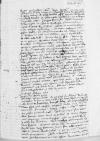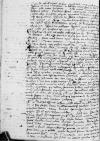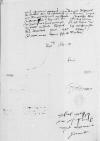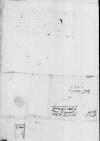Letter #859
Cornelis DE SCHEPPER & Nikolaus NIBSCHITZ (NIPSZYC) to Ioannes DANTISCUSInnsbruck, 1532-11-30
English register:
De Schepper is in good health. Valdés died of plague in Vienna. When the Emperor [Charles V] left for Mantua, De Schepper had to stay behind in Vienna to ensure the provisioning of the army.
The journey to Mantua is dangerous because of the hostility of the inhabitants of Styria and Carinthia. The Italian troops that preceded the Emperor on his journey have burned down several villages in this region. In revenge, the peasants have killed a number of members of the imperial retinue. De Schepper witnessed their corpses when travelling to Mantua with Godschalk [Eriksen] and the Archbishop of Lund [Johan Weze]. He can give no details about his mission, which is similar to previous ones. De Schepper stayed for a week in Mantua, after which he was sent on a secret mission to the King of the Romans [Ferdinand I].
He has tried in vain to get appointed by the Emperor as Latin secretary in succession to Valdés. Idiaquez, a protégé of [Francisco] de los Cobos [y Molina], is now in charge of Neapolitan affairs. The Emperor has made it clear that he will no longer need a Latin secretary. De Schepper is very embittered about this rejection.
Flanders was hit by heavy flooding. De Schepper’s wife [Elisabeth Donche] must soon give birth while he is far away, and for months he has been without news of her. Although frustrated about the whole situation, he stresses his trust in God and his equanimity in adversity.
Upon his arrival in Innsbruck he met their mutual friend Nicolaus Nibschitz, the envoy of the King and Queen of Poland [Sigismund I and Bona Sforza]. De Schepper sends his present letter through Karl Koczer, whom he encountered in the company of Nibschitz. The latter is no longer as good at drinking as he used to be.
The Emperor will travel from Mantua to Bologna, where he will meet the Pope [Clement VII]. De Schepper asks Dantiscus for support in his career problems.
After several military successes in the Peloponnese, Andrea Doria was called back to Italy to escort the Emperor to Spain. In Judenburg in Styria [Christoph] von Württemberg left the imperial company for an unknown destination. The situation is worsening continuously: they face threats from the French and English, floods, general dissatisfaction, unrest and famine in Italy. Charles V and his entourage were treated by the Duke of Mantua [Federico II Gonzaga] in an unworthy manner.
De Schepper is solicited by the King of France [Francis I], who offers him good conditions, but he wants to keep his integrity despite his outrage over the way he is treated.
He expresses his despair over his loss of support at court, the floods and the threat of revolt in his homeland. He plays with the idea of seeking refuge with Dantiscus, to spend the rest of his days there in all tranquility.
He has written to Queen Bona that he has been unable to achieve anything for her case, due to the death of Valdés. At present, [Nicolas Perrenot] de Granvelle and Cobos have all the power at court.
He is desperate over his present situation and longs to see Dantiscus again.
In a postscript De Schepper conveys greetings from [Georg von] Logschau to Dantiscus.
Manuscript sources:
Prints:
| ||||||||||||
Text & apparatus & commentary Plain text Text & commentary Text & apparatus
Reverendissimo in Christo Patri et Domino, domino
Reverendissime et excellentissime Domine, Pater honorandissime et cuius mihi ante oculos semper imago est.
Ego recte valeo, Deo gratia, relictus a
Interim
Nunc vero, cum orig. quum⌈cumcum orig. quum⌉ venissem
Si quando rebus nostris es bene apprecatus, nunc, quaeso orig. queso⌈quaesoquaeso orig. queso⌉, id age. Egemus enim bono intercessore et de rebus minus spero de die in diem. Alibi mera paupertas, alibi merus contemptus et defectus iudicii.
Res nostrae vadunt in deterius. Duo reges,
Nolo tamen molestus esse tibi, cui molestus esse non possum, sed aliquem angulum mihi reser hidden by binding⌈[r]r hidden by binding⌉va, in quo possim latere et reliquum vitae transigere. Et hoc tibi puta serio dictum, nam diutius ego multa concoquere non possum, si tamen volo, possum mederi. Sed haec orig. hec⌈haechaec orig. hec⌉ Deo nostro.
Nunc scripsi ad  UB H 154, f. 105r
meus est animus periturus, quo adempto desperatus iste Cornelius Deum est precaturus orig. praecaturus⌈precaturusprecaturus orig. praecaturus⌉, ut et adimatur et,
cf. Vulg. Mc 10:9:1; Vulg. Mt 19:6:2 Quod ergo Deus coniunxit, homo non separet; CroALa marul-mar-in-epigr.xml Commune sepulchrum esse uoluit ut, quorum animos amor iunxerat, eorum ossa mors non separet ⌊quos vita coniunxit, eosdem mors non separetcf. Vulg. Mc 10:9:1; Vulg. Mt 19:6:2 Quod ergo Deus coniunxit, homo non separet; CroALa marul-mar-in-epigr.xml Commune sepulchrum esse uoluit ut, quorum animos amor iunxerat, eorum ossa mors non separet ⌋.
UB H 154, f. 105r
meus est animus periturus, quo adempto desperatus iste Cornelius Deum est precaturus orig. praecaturus⌈precaturusprecaturus orig. praecaturus⌉, ut et adimatur et,
cf. Vulg. Mc 10:9:1; Vulg. Mt 19:6:2 Quod ergo Deus coniunxit, homo non separet; CroALa marul-mar-in-epigr.xml Commune sepulchrum esse uoluit ut, quorum animos amor iunxerat, eorum ossa mors non separet ⌊quos vita coniunxit, eosdem mors non separetcf. Vulg. Mc 10:9:1; Vulg. Mt 19:6:2 Quod ergo Deus coniunxit, homo non separet; CroALa marul-mar-in-epigr.xml Commune sepulchrum esse uoluit ut, quorum animos amor iunxerat, eorum ossa mors non separet ⌋.
Ex
Reverendissimae Celsitudinis Tuae filius
Postscript:
Communis noster amicus



